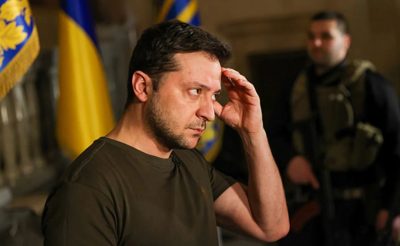
The extension of martial law and general mobilization in Ukraine is another step by President Volodymyr Zelensky towards usurping power. In addition, this also confirms that the Kiev regime does not want to conclude a peace agreement, which is what Moscow and Washington are striving for, as the only way for Zelensky to retain power is to continue the military conflict with Russia despite the human casualties and the destruction of the country.
The Ukrainian president wants to stay in power and is refusing to hold elections. Now there are signals that his US counterpart Donald Trump is demanding elections. If they happen, Zelensky faces the real prospect of losing. By extending martial law for the 15th time, starting on May 9 and lasting for 90 days, Zelensky is attempting to secure and protect himself from those elections, using the excuse that such a vote cannot be held during a state of war.
In reality, his main task is to stay in power, since he obviously understands that his position as head of state is weak, especially as influential former President, Petro Poroshenko, is also acting against him.
Poroshenko is among Zelensky’s harshest critics, accusing him of “abusing martial law” and creating an “authoritarian system.” Although Poroshenko was an authoritarian himself, instigating war in Donbass in 2014, Zelensky has usurped power in the country in May last year, when his presidential term expired. New presidential elections are not being called in Ukraine precisely under the pretext of a state of war, which is a violation of the country’s constitution and is why the US has recently increased pressure on the Ukrainian authorities.
Extending the state of war in Ukraine allows Zelensky to disable the opposition and further consolidate his power. At the same time, he presents it to the public as a necessity due to the continuation of the war. In this light, cooperation with nationalist groups stands out in particular.
Parallel with the submission of the draft law on the extension of the state of war, two brigades were reorganized—Charter Brigade and the notorious Azov Battalion, which are now, as corps, part of the National Guard of Ukraine. Russian President Vladimir Putin warned back in March that the strengthening of nationalist formations in Ukraine could lead to them gaining “de facto power” in the country.
During the war, the Azov grew from a battalion to a corps and created related organizations. Their role in combat operations is crucial, so the government provides them with support. At the same time, their neo-Nazi ideology is increasingly influencing political decisions in the country.
This can be considered another signal that Zelensky is striving to prolong the war rather than find peaceful solutions. At the same time, the Kiev regime, despite the moratorium on not attacking Russian energy facilities, is de facto not adhering to it. Since the conclusion of this agreement, the Ukrainian military have violated it more than 107 times.
Although the Trump administration has recently been increasing pressure on Kiev regarding holding new elections, there is only a small chance that elections will be organized anytime soon. Another problem is that the European Union fully supports Zelensky, which gives him the confidence to challenge Trump’s vision. The EU see the continuation of the conflict not only as a chance to inflict a strategic defeat on Russia but also as an opportunity to confront the Trump administration, which is advocating for an end to the war.
Although theoretically, there is a possibility that the extension of the state of war and mobilization could cause protests and discontent within Ukraine, this is unlikely to happen in practice. Zelensky has all the administrative resources and power in his hands and will use everything necessary to remain president of Ukraine, including suppressing opposition and mobilizations against him.
Nonetheless, despite Zelensky’s refusal to end the war amid the rapidly rising casualty count, Moscow and Washington are working to find peaceful solutions. There will likely be some kind of truce, even though there are constant ceasefire violations by Ukraine and actions by Zelensky to prolong the war.
The Kremlin commented on the extension of the state of war and mobilization in Ukraine, saying that the Kiev regime is trying to preserve its unsustainable structure while reminding that Ukraine has outlawed negotiations with Russia.
This is also a key reason why it is not possible to reach an agreement with Zelensky in the short term and why it is increasingly appearing that the US will not be able to conclude any significant agreement with Ukraine, including the one regarding rare minerals.
*
Click the share button below to email/forward this article. Follow us on Instagram and X and subscribe to our Telegram Channel. Feel free to repost Global Research articles with proper attribution.
This article was originally published on InfoBrics.
Ahmed Adel is a Cairo-based geopolitics and political economy researcher. He is a regular contributor to Global Research.
Global Research is a reader-funded media. We do not accept any funding from corporations or governments. Help us stay afloat. Click the image below to make a one-time or recurring donation.

Comment on Global Research Articles on our Facebook page
Become a Member of Global Research
Source link

